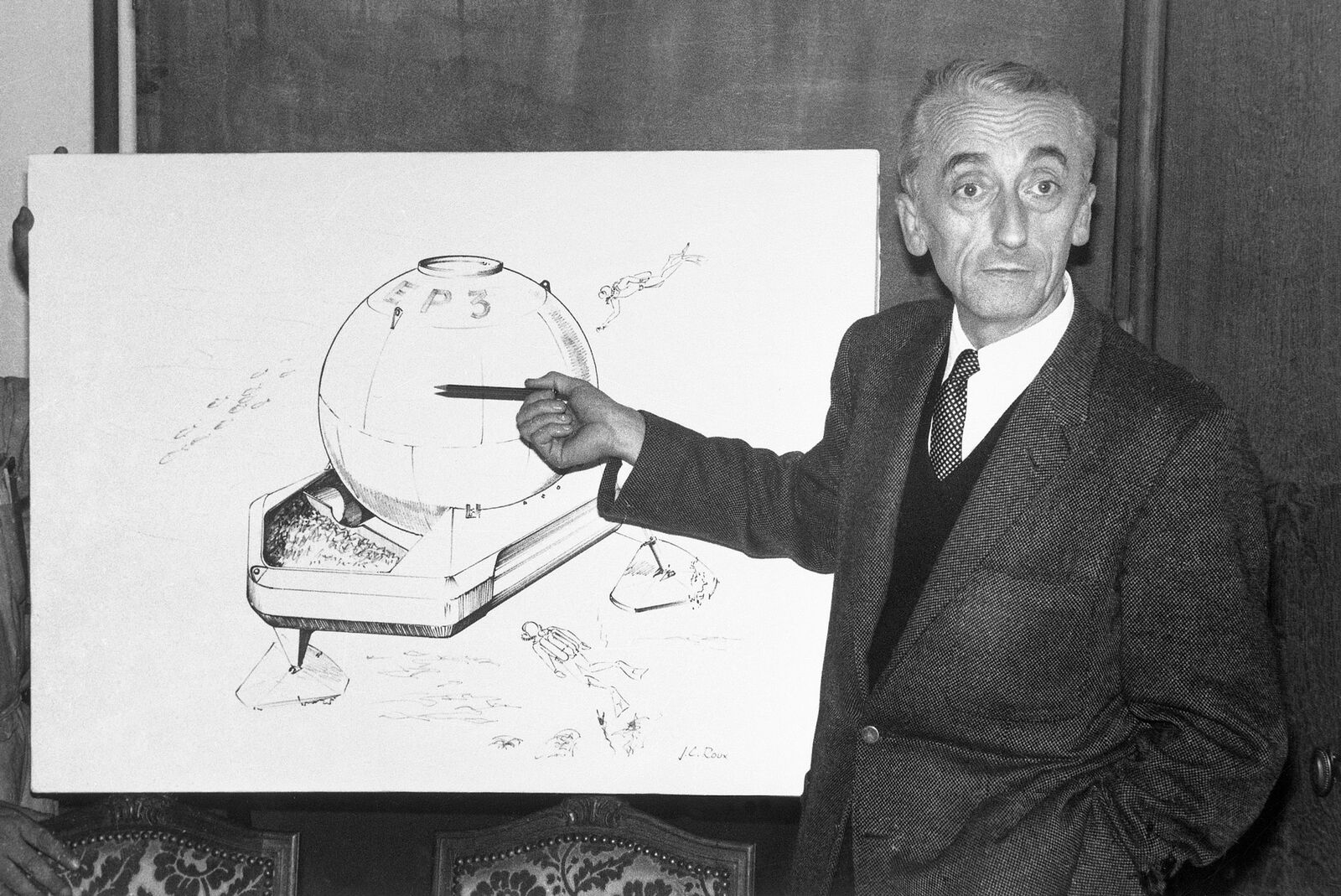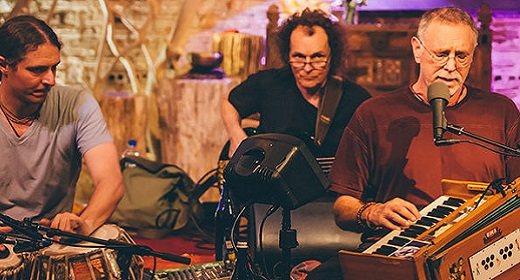by Laura Lombrana: The grandson of the famous explorer is creating a sea station where scientists can live under the ocean while studying climate change…
Fabien Cousteau took a last look at the steel capsule that had been his home for 31 days as he ascended gently toward the warm surface of the Florida Bay waters. After a month living in a confined space, 63 feet deep in the ocean with no sunlight, he had just one thought in his mind: how to get back there, for longer.
“To have to go back to the surface was one of the saddest moments in my ocean exploration career,” Cousteau says. “I was more than happy to go another month, but unfortunately budgets don’t allow for that.”
That was June 2014 and the idea of returning for a longer stay has been bugging him ever since. The oldest grandson of legendary ocean explorer Jacques-Yves Cousteau, Fabien learned to dive at age 4, went on his first expedition at 7, and admits his fondest family memories are of reunions on board ocean exploration ships.
“How can I spend more time in this amazing display of life, this Pandora’s box of mysteries, this place that we know so little about?” he says. “The frustration as a scuba diver is having to give up the experience after just one hour—observing our physical limitations and fathoming the idea of spending more time at the bottom.”
Now 53, Cousteau is embarking on a quest to fulfill his dream of living underwater. The challenge takes direct inspiration from one of his grandfather’s most grandiose projects. Jacques Cousteau’s three Continental Shelf, or Conshelf, stations, all built during the 1960s, were submarine habitats that broke ground in proving humans could live underwater at great depths, and for long periods of time.
The first habitats were dismantled shortly after the missions ended, and Fabien Cousteau’s plans are much more ambitious. Project Proteus, named after a Greek god who was a herdsman of sea beasts, will be larger than its predecessors, and permanent, hosting up to 12 researchers at once for weeks and even months at a time. The first blueprints show it as a giant steel starfish, with a central body anchored to the seabed, surrounded with modular pods used as laboratories, sleeping quarters, and medical bays.

“Imagine building the International Space Station underwater,” Cousteau says. “It means you can monitor 24/7 climate change related issues—we can have a livestream of data from the bottom of the sea, a finger on the pulse of the ocean health that will help us make better policy and business decisions.”
Data captured from Proteus could improve scientists’ understanding of ocean salinity, acidity, temperature variations, and pollution. Changes in these metrics could help better predict storms and give a more complete picture of ocean warming. It makes business sense, too, Cousteau argues. Samples of algae, coral, and fish could lead to pharmaceutical companies finding new cures for human diseases.
It can all be done—for $135 million.

“This is beyond the scope of any nation wanting to fund national science infrastructure,” says Mark Patterson, a professor at Northeastern University in Boston and a member of the advisory board at Cousteau’s nonprofit Ocean Learning Center. “The model is going to be different than what existed before with more academically focused underwater habitats.”
But Proteus won’t depend on strapped governments dealing with the worst public health and economic crises in modern history. Philanthropists and private companies looking to profit from its discoveries will fund the lion’s share of the project, and that means Cousteau will need to deal with the conflicts of interest that may arise. He says there are red lines. “Proteus is a public good platform; it is not a platform to create weapons of war.”

The challenges are technical, too. The giant submarine steel structure is an engineering feat. Cousteau wants the installation to be powered with ocean thermal energy conversion, a type of renewable power in its initial stages of development, which uses temperature differences between shallow and deep waters to produce energy.
There’s a reason underwater sea stations fell out of favor. Advances in technology, communications, remote sensing, and automation systems made buoys, drones, and robots cheaper to build and deploy. After an initial boom in the 1960s and ’70s following Jacques Cousteau’s missions, underwater habitats were gradually abandoned.
“If you enjoy science fiction, they’re very appealing,” says David Ho, an oceanographer at University of Hawaii, who conducted research at Biosphere 2, another experiment where researchers lived in a sealed environment. “But if you’re more pragmatic you might ask: What kind of groundbreaking science came out of them?”
Ho, who focuses on the carbon cycle and the uptake of carbon dioxide by the ocean, was part of a team that eventually concluded that concrete in buildings can absorb carbon dioxide from the atmosphere. Although it was an interesting issue to explore, the big questions on climate change and the oceans won’t be answered through these sorts of experiments, he says. Important research can be conducted in remote areas by deploying autonomous robots, drones and sensors that can measure metrics like oxygen levels in ocean waters.
But machines alone can’t fulfill Cousteau’s other mission—making young people fall in love with the ocean. No robot can do that better than humans, he says. “I’m a big fan of technology, but if we don’t have that human interface, there’s a lot that we are missing,” Cousteau says.

Jacques Cousteau’s most important contributions to oceanography weren’t the discoveries. Images of him braving ocean depths in a bright yellow saucer, entering the Conshelf II underwater habitat in a shiny gray diving suit captured the imagination of a generation. The sight of his crew sipping wine, playing chess, and smoking pipes and cigarettes proved to the world that living underwater was not just possible but also could be done in style.
“He inspired all these people that went into marine sciences and made discoveries,” Ho says. “There are other values to it than direct scientific outcomes.”
There’s a fine line between exploring and exploiting the seas. Some of Jacques Cousteau’s first missions were funded by the fossil fuel industry when deep-sea oil drilling was in its infancy.
In 1954, before the red-capped Frenchman became famous and was able to self-fund his research, British Petroleum (now BP Plc) and the Compagnie Française des Pétroles (now Total SE) paid for a 10-week exploration mission in which Cousteau and his divers retrieved rock samples that led to the discovery of oil in the Arabian Gulf.
“We had a very good contract which enabled us to install the radar and measure the equipment we lacked,” Jacques Cousteau said in an interview in 1991. “We were the people who discovered oil in the Gulf! It was us who made the emirate of Abu Dhabi rich!”
In the late ’60s, Conshelf III, the last of his underwater habitats, was built as an experimental oil rig where six divers proved it was possible to perform industrial tasks underwater. Later, the explorer expressed regret about his ties with the fossil fuel sector, fully embracing nature conservancy and rejecting the exploitation of the seas.

“When I realized to what extent the oceans were threatened, I decided to campaign as vigorously as I could against everything that threatened what I loved,” he said in the same interview. “My story forms a cycle—I hope my children can follow the same path.”
Fabien Cousteau traveled often to meet his grandparents in their apartment in Monaco, or to exotic locations such as Papua New Guinea or the Amazon. The family shared meals and conversations around the dinner table of Calypso, Jacques Cousteau’s famous exploration boat.
“As a child, and with a wandering mind growing up, I was not the best student in the world, unless I was surrounded by teachers who were just as passionate as I was about life,” Fabien Cousteau says. “Even now I’m a very driven and anxious person to get things done.”
Stuck in his apartment in New York because of the coronavirus pandemic, Cousteau admits he struggles to remain patient while he can’t travel. An energetic public speaker, he has moved 32 times in his life, dived often, and filmed several shark documentaries, including one in which he got into a shark costume, mirroring Tintin’s Red Rackham’s Treasure book.

Blond, blue-eyed and with a slight resemblance to Hergé’s comic adventurer, Fabien Cousteau has embraced some of the causes his grandfather championed. His 31 days underwater in 2014 helped raise awareness and money for Aquarius Reef Base, the world’s only remaining submarine habitat.
“Shortly after Mission 31 I came to the realization that Aquarius is not going to last much longer,” he says. “The idea of Proteus was born by looking at the shortcomings of previous habitats, be it the lack of internal space, equipment, and the antiquated nature of a 30-year-old underwater facility.”
For decades, Aquarius depended on federal funding, its survival threatened by government shutdowns and policy changes. Now managed by Florida International University, Aquarius has gone from being active back-to-back for eight months a year to hosting just three Army missions and one with NASA in 2019.
“We haven’t hit that sweet spot on how to make sure that Aquarius stays true to its main science and exploration roots, and still get the proper corporate sponsor that doesn’t turn it into a reality-type show that denigrates everything we’ve built,” says Aquarius executive director Thomas Potts. “It’s that trade-off: What will they want in return? Once you get corporate funding, nothing is for free,” he says. “Scientists are generally bad at talking the language of business and vice versa, maybe that’s why.”
Fabien Cousteau’s ability to transition seamlessly between business and academia could be the key to Proteus’s success. Through his career, he has talked often about the oceans’ untapped business potential, and about the need to strike a balance between economic activities and environmental protection.
“Oceans are like an immense bank account of infinite natural resources,” he said in an interview in 2014, shortly after emerging from Aquarius. “But their exploitation must be reasonable.”
Biochemical structures found only underwater could lead to new cures and treatments. Pharmaceutical companies could rent Proteus, take samples, and analyze them on site. Unlike the oil or gas industries that wipe out whole areas, pharmaceutical companies capture a limited number of samples and then synthesize them in laboratories, so the damage is limited.
“Pharma spend millions of dollars a day on research in terrestrial laboratories,” he says. “If you’re able to tap into underwater research in a way that gives you 35 to 100 times more efficiency, all of a sudden you’re saving huge amounts of money, you’re saving millions of dollars a year by participating in and renting this habitat.”
Mark Hartl, a biologist at Heriot-Watt University in the U.K. that has researched drugs based on marine components, warns that oceans, and the deep-sea environment in particular, are extremely delicate and would need millennia to recover from any damaging intervention.
“There’s so much of it that we haven’t really explored,” Hartl says. “If we are exploiting it, we need to do it in the most sustainable way possible.”

Scientific understanding of the seas is limited when compared with the knowledge humans have of land and the atmosphere, and technology is one reason for that. Ocean research often needs to happen in remote locations and at great depths. Storms and bad sea conditions sometimes make immersion by humans or robots impossible.
Yet the seas are essential to our understanding of global warming, and to accurately predict what will happen over the next few decades. Oceans have absorbed 93% of heat captured by greenhouse gases since the 1970s. Without them, the 1.2°C of warming that Earth has experienced since pre-industrial times would be much more acute—and so would be extreme events such as heatwaves and hurricanes.
Recent research suggests that oceans’ capacity to act as carbon sinks is diminishing. The uptake of carbon dioxide from the atmosphere in the water is causing acidification, which in turn leads to the bleaching of coral reefs and threatens the survival of marine species.
“The ocean is actually changing underneath of us much faster than human beings have ever had the ability to observe,” says Patterson, the Northeastern University professor. “This has hamstrung oceanography from Day 1.”
The ability to observe has improved in recent decades with the combination of swimming robots, manned and unmanned aircraft, sensors attached to commercial ships, and satellites in space. The millions of data points gathered by these devices are introduced into complex scientific models that can predict the effect of climate change on metrics such as water acidification, sea ice melting, or sea level rise.
“Proteus offers a tool that we’ve been missing,” Cousteau says. Spending entire weeks underwater will give scientists a constant stream of data and samples, as opposed to being limited by weather conditions and the size of the diver’s oxygen tank. The Aquarius mission in 2014 gathered in one month the same amount of data a conventional mission would have gathered in three years.

“If you don’t have a presence, you don’t even know what you’re missing,” says Oscar Schofield, a biological oceanographer at Rutgers University and a scientific adviser to Cousteau. “This experiment will allow people to ask questions that we can’t even think of right now.”
But David Ho, the oceanographer who participated in the Biosphere 2 experiments, thinks there are other places where research could be more fruitful. He says the next big steps for scientists are to improve processing of the huge amount of data captured by existing devices and to gather information from places so isolated, with such extreme climates, that they remain black holes of scientific knowledge.
“If you were to do science in the Southern Ocean, it’s cold, and dark, and not that appealing to the general public,” Ho says. “But in terms of the information content I think it would be a lot more useful.”

Since the Proteus mission was announced in July, at least one family investment firm has invested in the project’s first phase, Cousteau says, declining to disclose the size of the investment or the name of the firm because it requested anonymity. He is in discussions with several similar entities, he said.
“Many folks that have accumulated a lot of wealth, often in the tech sector, are very concerned about global warming,” Patterson says. “Lots of high-net-worth individuals out there could make this happen overnight—those people are being talked to.”
As soon as the pandemic allows for international travel, Cousteau plans to fly to Curaçao to conduct feasibility studies on the best place to install the habitat. Once government permits, geology, and topography are sorted out, his team will focus on engineering and design. After that, construction could start.
The whole process could take up to three years and Cousteau hopes to start installing Proteus in late 2023. Academic researchers and companies will be able to rent the installation and work there, at a rate that Cousteau hopes will be lower than the cost of renting a research vessel.
Whether Proteus advances climate and ocean science, or finds breakthrough treatments that lead to profits for pharmaceutical companies will be up to the aquanauts living and working there.
“How can we use this as an invaluable tool to broadcast to the world the beauty, the fragility, the understanding of the underwater world in ways that we haven’t done yet?” Cousteau asks. “The human-ocean connection is so paramount to my mission in life—that’s what my grandfather told me, that people protect what they love.”
Source: Bloomberg




















































